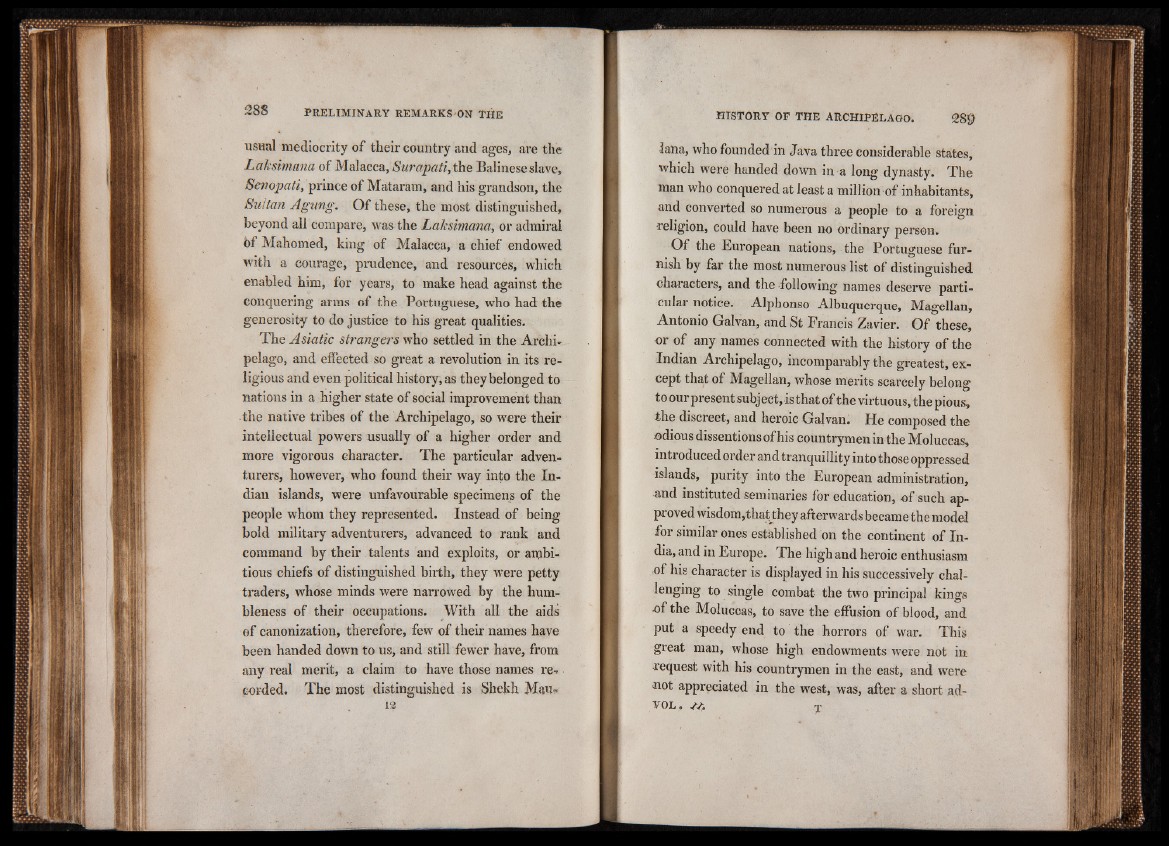
usual mediocrity of their country «and ages, are the
Laksimana of Malacca, Surapati,the Balinese slave,
Senopati, prince of Mataram, and his grandson, the
Sultan Agimg. Of these, the most distinguished,
beyond all compare, was the Laksimana, or admiral
bf Mahomed, king of Malacca, a chief endowed
with a courage, prudence, and resources, which
enabled him, for years, to make head against the
conquering arms of the Portuguese, who had the
generosity to do justice to his great qualities.
The Asiatic strangers who settled in the Archipelago,
and effected so great a revolution in its religious
and even political history , as they belonged to
nations in a higher state of social improvement than
the native tribes of the Archipelago, so were their
intellectual powers usually of a higher order and
more vigorous character. The particular adventurers,
however, who found their way into the Indian
islands, were unfavourable specimens of the
people whom they represented. Instead of being
bold military adventurers, advanced to rank and
command by their talents and exploits, or ambitious
chiefs of distinguished birth, they were petty
traders, whose minds were narrowed by the humbleness
of their occupations. With all the aids
of canonization, therefore, few of their names have
been handed down to us, and still fewer have, from
any real merit, a claim to have those names recorded.
The most distinguished is Shekh Mau-
12
lana, who founded in Java three considerable states,
which were handed down in a long dynasty. The
man who conquered at least a million of inhabitants,
and converted so numerous a people to a foreign
■religion, could have been no ordinary person.
Of the European nations, the Portuguese furnish
by far the most numerous list of distinguished
characters, and the following names deserve particular
notice. Alphonso Albuquerque, Magellan,
Antonio Galvan, and St Erancis Zavier. Of these,
or of any names connected with the history of the
Indian Archipelago, incomparably the greatest, except
that of Magellan, whose merits scarcely belong
to our present subject, is that of the virtuous, the pious,
the discreet, and heroic Galvan. He composed the
odious dissentions of his countrymen in the Moluccas,
introduced order and tranquillity into those oppressed
islands, purity into the European administration,
and instituted seminaries for education, of such approved
wisdom,thatthey afterwards became the model
for similar ones established on the continent of India,
and in Europe. The high and heroic enthusiasm
of his character is displayed in his successively challenging
to single combat the two principal kings
of the Moluccas, to save the effusion of blood, and
put a speedy end to the horrors of war. This
great man, whose high endowments were not in
•request with his countrymen in the east, and were
not appreciated in the west, was, after a short ad-
VOL • j